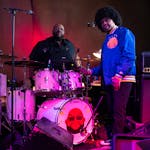AUSTIN, TEXAS – Always on the lookout for the next big thing in music, industry professionals at the South by Southwest Conference in 2017 are focused on the little things that rule our lives: mobile devices.
Many of the buzz bands at Austin's 31st annual music-biz mega-fest are ones that have racked up impressive listening numbers on Spotify, Apple Music and other streaming services favored by cellphone and tablet users — especially by millennials and younger, trendsetting music fans.
"It's reinventing the way independent artists get discovered," said Raji the One, a Minneapolis rapper who's little-known in his hometown scene, but who earned SXSW showcases thanks to his 8 million plays on Spotify.
Mobile devices are even taking over the performance realm.
"Get your phones up!" New York rapper Young M.A. urged her crowd on Wednesday night. All the photos and videos being shot in front of the hundreds of stages and thousands of bands in Austin this week reiterated the proliferation of mobile devices at concerts, which many performers now encourage.
Young M.A. first broke big on YouTube, another avenue where more and more young listeners are consuming music on their phones. YouTube upped its presence at SXSW this year with a hi-fi venue and popular nightly parties with performers such as Solange and Rag 'n' Bone Man.
Headlining a day party Thursday for Pandora, one of the pioneering streaming companies, Minneapolis hip-hop star Lizzo talked up her new six-song EP, "Coconut Oil." She didn't bother telling the capacity crowd to pick it up at the merch stand, though; it's only available as a digital release.
"It's 2017, so you can stream just about everything," the red-hot rapper/singer said on stage, cheerfully plugging the sponsor behind her seventh of 10 performances in Austin this week: "Like on Pandora!"
Streaming services crossed the milestone of 100 million paid subscribers in 2016, and record companies are starting to make more money off streams than they are album sales. Thanks to Drake and other artists favored by young, mobile-centric music listeners, Universal Music made an estimated $1.1 billion in streaming revenue in the first nine months of 2016, according to Bloomberg News.
Of course, those numbers are not music to everyone's ears. As foreseeable as the long lines outside Apple's Austin party Wednesday night — where streaming hitmakers the Chainsmokers performed — many SXSW professionals voiced dissent for mobile music consumption, especially musicians themselves.
Streaming results in lower royalty payments for artists and poorer audio quality.
There are also concerns that the proliferation of handheld devices in the industry might lead to digital data dictating what makes it big in the biz, over old-fashioned good taste.
Talking on an industry panel Wednesday at the Austin Convention Center titled "Digital Revolution: A look at Music's New Frontier," Los Angeles pop-rocker Bridgit Mendler could have bragged about landing the No. 1 iTunes hit "Ready or Not." Instead, she told an anecdote from a day earlier, when her record label asked her to approve a new mix of one of her songs while in Austin.
"I can't give notes on it because I'm listening to it on my phone with one earphone as I'm walking down the street!" Mendler told a laughing audience.
Famed indie label co-founder Jonathan Poneman of Sub Pop Records — the Seattle company that first signed Nirvana and Soundgarden — offered a more grave assessment of the mobile music takeover on another panel. Even though he said he generally enjoys streaming services himself "for the convenience of it," Poneman believes the global/mass-appeal nature of mobile music consumption detracts from the localized live music experiences of old.
More and more bands are being discovered on phones instead of in clubs, quite a conundrum for the club-oriented SXSW conference.
"In the digital era, we have to figure out a way to keep local masses tuned in [to] support local music scenes," Poneman said, pointing to the end of scenes like the famous grunge era he fostered in the late-1980s. "The Seattle scene probably was the last kind of regional scene that emerged the way it did."
Twin Cities singer/songwriter Jeremy Messersmith — who is previewing a new album for the musichead masses in Austin this week — was told by his record label Glassnote in New York that "physical" formats such as vinyl and CDs account for a significantly smaller amount of sales than just three years ago when he released his last record.
"Streaming is becoming more important, adding up the numbers on how many people are listening to it on Spotify and whatnot," said Messersmith, who still wants to stay faithful to independent record stores that have supported his career. "They told me they will get me vinyl to sell in the stores."
Neither a physical album release nor a live audience following are priorities for Raji the One, aka 26-year-old Minneapolis rapper Jamal Rogers, who said, "Streaming is everything for me right now. It helps artists stay independent."
Rogers' song "#WhiteGirlVoice" landed on some influential Spotify playlists after one of the company's curators heard it from a friend's teenage son.
Another SXSW industry panel discussed how vital such lists have become in breaking new artists, although Pandora curator Rachel Whitney warned, "We're just one small cog in a very big wheel. [Artists] still need to tour."
Raji the One begged to differ. Before his official SXSW showcase Thursday night in a large Sixth Street club — which only drew a modest crowd of about 100 people despite his online numbers — the rapper said he's very happy with his success so far as a stream-based act.
"It's been great for me," he said, explaining that he has made about $5,500 per million plays on Spotify and other streaming services, which typically pay a royalty rate between $0.005-$0.007 per stream. "And it's kicking open a lot of other doors for me."
Chris Riemenschneider 612-673-4658 • @ChrisRstrib




